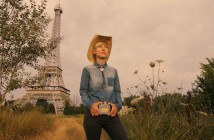Cast: Christos Stergioglou, Michele Valley, Aggeliki Papoulia
Director: Giorgos Lanthimos
Country: Greece
Genre: Drama
Official Trailer: Here
For an addition take of on Dogtooth, check out Ronan’s review.
Dogtooth opens with a perverse game of nonsense dictionary, where the objective is to learn the wrong definition of select words. Two girls and a boy - siblings, we learn later - listen to a recording where a voice forces arbitrary meanings into innocent nouns. “Sea”, says the voice, “is a leather armchair with wooden arms”. At first, we in the audience can write off the recording as some kind of surreal poetic exercise. But then we watch an even more unbelievable situation. Quickly forgetting the nonsense dictionary, one of the siblings suggests a new psychotic game, in which the goal is to keep a single finger lodged in near-boiling water for as long as possible. What is even more perplexing than her suggestion is that her brother and sister agree to it with enthusiasm.
Suddenly, the film becomes unhinged. Is this a dream film? A frigid art movie with inert characters? Is it a modern-day retelling of 1984, complete with its own, albeit more domestic, Ministry of Truth? Are these kids insane? Are they mentally challenged? Or maybe just severely anti-social? We eventually discover that they are kept in captivity by their dictatorial father. Their manners and behavior are so extraordinary, that we must assume they have never strayed outside the limits of their home. In fact, they are explicitly advised against doing so, and, for them, whatever lies beyond the main gate of their ostentatious property is a forbidden land of indescribable monsters, or, as they hilariously come to fear, nightmarish kitties.
Suddenly, the film becomes unhinged. Is this a dream film? A frigid art movie with inert characters? Is it a modern-day retelling of 1984, complete with its own, albeit more domestic, Ministry of Truth? Are these kids insane? Are they mentally challenged? Or maybe just severely anti-social?
Ensconced in the space of their home, then, the siblings are shaped by the only society they know, their parents. The family unit is disrupted at frequent intervals by a single individual, a security woman who works at the factory overseen by father. Employed as a routine prostitute to quench the son’s erotic impulses, she teaches the siblings about oral sex and introduces into their lingo magical terms like “pussy”, which up until then the family had been calling a “keyboard”. This is the turning point, when the cultural narrative imposed by the parents begins to crumble, as their adolescent children discover an alternative narrative, another history of mankind, which remains mostly unknown to them, but which, in its traces, manages to be revolutionary by expanding their mental universe.
Dogtooth is a metaphor for the dictatorial state, an eccentric portrait of a dysfunctional family, and a thinly-veiled satire about the reclusive high class, hidden from the world behind the protection of their walls and the racism of their ideology. It never stoops to lecture about any of these topics, because it so miraculously depicts its characters that the story, impossibly enough, comes across as believable. We are so immersed in the specificity of these weird siblings and their insane parents that the larger, more general relevance of their dilemma only registers as an echo once the film has closed. A ringing, unnerving echo.
We are so immersed in the specificity of these weird siblings and their insane parents that the larger, more general relevance of their dilemma only registers as an echo once the film has closed.
Like Truman in The Truman Show, the siblings - or, at least, one of them - begin to yearn for the unknown wasteland outside the fake utopia that has been constructed in their name. They are not necessarily unhappy with their utopia, since they participate in their imprisonment and often freely choose how to waste their lives in the idle of endless days, spent in autodidactic chores meant to teach them what their parents want them to understand. The activities they imagine for themselves are mere extensions of the enslavement their father has ordained, since only that enslavement is known to them. Trained in the twisted philosophy of their father, they now act as their own jailers. Only a competing philosophy can subvert this cycle of servility, because the ideological fortress constructed by father has only one weakness: it affords no competition, and so the sole existence of competition is an argument against its truth-value.
This ideological fortress nurtures soldiers who attack from inside. Reared in the ways of self-control, mindless bravery, and sheer will, the siblings can apply the same strength to rebellion as they have always applied to subordination. Only one sibling actually rebels, but the other two could realistically follow behind her example, though the film ends before that happens. Her burgeoning disobedience is triumphantly primal and savage, an explosion of the self against the sterile architecture of her father’s upbringing. Her disobedience is also, perhaps, suicidal and disturbing. It is a selfish revolution, meant to emancipate her own chained potential. Forced to master the narrow skill set and doctored knowledge filtered by her parents, she cannot ever grow into adulthood. With an artificial and limited society as her guide, she can only be queen of her personal cobblestone, the restricted perimeter of her dreams and hopes. So she yearns to escape one utopia and fall into the embrace of another, the utopia of chaotic possibility, of danger and possible death.
[notification type=”star”]85/100 ~ GREAT. Dogtooth is a metaphor for the dictatorial state, an eccentric portrait of a dysfunctional family, and a thinly-veiled satire about the reclusive high class, hidden from the world behind the protection of their walls and the racism of their ideology.[/notification]




